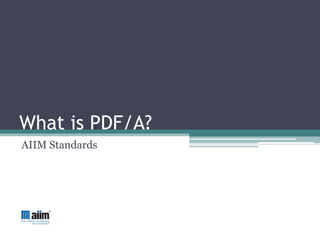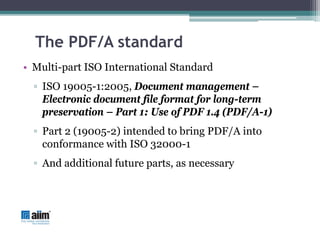What is PDF/A?
- 1. What is PDF/A? AIIM Standards
- 2. About AIIM AIIM, the Industry Association helping organizations to find, control and optimize their information with: –Market Education –Professional Development –Membership and Peer Networking AIIM, an ANSI Accredited Standards Developer and: –Secretariat for ISO TC171, Document Management –Secretariat for ISO TC171, SC2, Document Management, Application Issues –U.S. Technical Advisory Group (TAG) Administrator –Facilitating the development of PDF Standards
- 3. PDF/A is • Not a… ▫ Document management solution ▫ Preservation method • Is a… ▫ File format
- 4. Electronic Document • PDF/A is all about electronic or born digital documents – this is how the standard defines electronic documents “Electronic representation of a page-oriented aggregation of text and graphic data, and metadata useful to identify, understand and render that data, that can be reproduced on paper or optical microform without significant loss of its information content. ” Source: ISO 19005-1
- 5. Definition of Long-term Long-term is important to PDF/A, this is how we define long-term: Long-term: “period of time long enough for there to be concern about the impacts of changing technologies, including support for new media and data formats, and of a changing user community, on the information being held in a repository, which may extend into the indefinite future” Source: ISO 19005-1
- 6. What is the Business Need for PDF/A? • Cradle to grave (Full life cycle of the document) • PDF like the Rosetta Stone • Compatibility into future • Migration (Only migrate media) • Independence (Not reliant on Specific hardware or software)
- 7. Users who will benefit • Legal • Academics • Archivists • Records Managers • Historians • Technical and scientific • Office and Business
- 8. Potential Preservation Electronic Document Types • TIFF • XML • Native File Formats • PDF
- 9. Electronic Document Types • TIFF ▫ Well known ▫ Difficult to create digitally born documents ▫ Indexing documents may be difficult ▫ Access is through an index
- 10. Electronic Document Types • XML ▫ Many schema exist ▫ Preserves content not the structure ▫ Depends on DTD for visual appearance
- 11. Electronic Document Types • Native File Formats ▫ Several file formats (.doc, .docx, .wpd, .rtf, .xls) ▫ May render differently depending on the device or platform used ▫ May be proprietary
- 12. PDF • Portable Document Format ▫ Widely used world wide  Business  Government  Libraries and archives ▫ Information must be kept for long periods of time ▫ Must remain useable and accessible across multiple generations of technology
- 13. What is PDF? • Reliable consistent viewing and printing • Mix text, raster images, line art, color • Basic unit is the page • Easy navigation, fast access to any page • Small file size
- 14. Why Standardize a Version of PDF • PDF is powerful and flexible • May be too flexible for some applications • Need higher degree of reliability • May want standard in hands of neutral non-commercial body
- 15. PDF/A: The Standard ISO 19005-1:2005, Document management – Electronic document file format for long-term preservation – Part 1: Use of PDF 1.4 (PDF/A-1)
- 16. The PDF/A standard • PDF/A is a file format standard • PDF/A is just one component of a comprehensive preservation strategy ▫ Successful implementation depends upon:  Records management policies and procedures  Additional requirements and conditions  Quality assurance processes
- 17. PDF/A • PDF/A is intended to address three primary issues: ▫ Define a file format that preserves the static visual appearance of electronic documents over time ▫ Provide a framework for recording metadata about electronic documents ▫ Provide a framework for defining the logical structure and semantic properties of electronic documents
- 18. What is in the PDF/A Standard? • Conformance Levels • Technical requirements ▫ Lay out similar to PDF Reference 1.4 ▫ Defines required, restricted, prohibited • Best Practices
- 19. PDF/A Concept • Develop a standard based on a restricted subset of PDF • Published by Internationally recognized standards body such as ISO • Focus on archive needs of governments, corporations, libraries
- 20. PDF/A Usage • PDF/A standard may be used by vendors to: ▫ Develop applications that read and write and otherwise process PDF/A files • These applications will be used by organizations to: ▫ Create and process PDF/A conformant files  As part of their business processes  In conjunction with necessary adjunct archival and records management policies and procedures
- 21. ISO/TC 171/SC 2/WG 5 • ISO Joint Working Group (JWG) for ISO 19005-1 (PDF/A) ▫ ISO/TC 171/SC 2, Document management applications – Application issues ▫ ISO/TC 130, Graphic technology ▫ ISO/TC 46/SC 11, Information and documentation – Archives/records management ▫ ISO/TC 42, Photography
- 22. The PDF/A standard • Multi-part ISO International Standard ▫ ISO 19005-1:2005, Document management – Electronic document file format for long-term preservation – Part 1: Use of PDF 1.4 (PDF/A-1) ▫ Part 2 (19005-2) intended to bring PDF/A into conformance with ISO 32000-1 ▫ And additional future parts, as necessary
- 23. PDF/A Terminology • PDF/A-1 refers to the format defined by Part 1 (ISO 19005-1) of the standard • Part 2 (ISO 19005-2) will define PDF/A-2 • New Parts can be added to the PDF/A family of standards without making previous Parts obsolete • Conformance Level A identified as PDF/A-1a • Conformance Level B identified as PDF/A-1b
- 24. Role of AIIM and NPES • PDF/A Standard Developers in the United States – • AIIM, Association for Information and Image Management ▫ Secretariat to ISO/TC 171 and ISO/TC 171/SC2 ▫ Secretariat to US Technical Advisory Group (TAG) for ISO/TC 171 • NPES, The Association for Suppliers of Printing, Publishing, and Converting Technologies ▫ Secretariat to ANSI Committee for Graphic Arts Technologies Standards (CGATS) ▫ Secretariat to US TAG for ISO/TC 130
- 25. PDF/A Caveats • However… ▫ PDF/A alone does not guarantee preservation ▫ PDF/A alone does not guarantee exact replication of source material ▫ The intent of PDF/A is not to claim that PDF-based solutions are the best way to preserve electronic documents ▫ But once you have decided to use a PDF-based approach, PDF/A defines an archival profile of PDF that is more amenable to long-term preservation
- 26. Definition of Conformance Levels Conformance levels enforce the requirements established in the standard. This is what we mean by conformance level. Conformance Level: “identified set of restrictions and requirements to which files and readers must comply” Source: ISO 19005-1
- 27. PDF/A Conformance • Two Conformance Levels ▫ PDF/A-1a (full conformance) ▫ PDF/A-1b(preserves visual appearance only)
- 28. PDF/A requirements • Conformance to PDF 1.4 PDF 1.4 • With features that are required, recommended, restricted, prohibited Recommended • Reader functional Required Prohibited requirements • Features not documented Restricted in 1.4 are ignored by PDF/A readers
- 29. Technical Requirements • File Structure • Graphics • Fonts • Transparency • Annotations • Actions • Metadata • Logical Structure • Interactive Forms
- 30. Creating PDF/A Files • Electronic Documents to PDF/A ▫ Native file to PDF/A ▫ PDF to PDF/A • Scanning to PDF/A • Converting to PDF/A • Saving emails to PDF/A
- 31. PDF/A from Scanned Documents • Documents originate in paper format • Most scanners support PDF • Some scanners support PDF/A • Scan to PDF • Specify PDF/A compliant
- 32. Office 2007 A PDF/A file can be created from a Microsoft Word document.
- 33. Validating – Preflight To make sure the PDF/A file is correct, Preflight can be run.
- 34. Other PDF Standards • PDF/E (Engineering), ISO 24517-1 ▫ For engineering, architectural, and GIS documents • PDF/UA (Universal Access) ▫ Intended to address Section 508 concerns • PDF Healthcare ▫ Exchange of electronic health records • PDF, ISO 32000-1 ▫ PDF Reference on which PDF is based • PDF/X, ISO 15930 ▫ Pre-press data exchange
- 35. Further Information • AIIM’s PDF/A Committee web page http://www.aiim.org/pdfa • AIIM’s PDF Expert Corner http://www.aiim.org/standards.asp?ID=33736 • NPES PDF/A Toolkit http://www.npes.org/standards/toolspdfa.html • PDF/A Competence Center http://www.pdfa.org



































